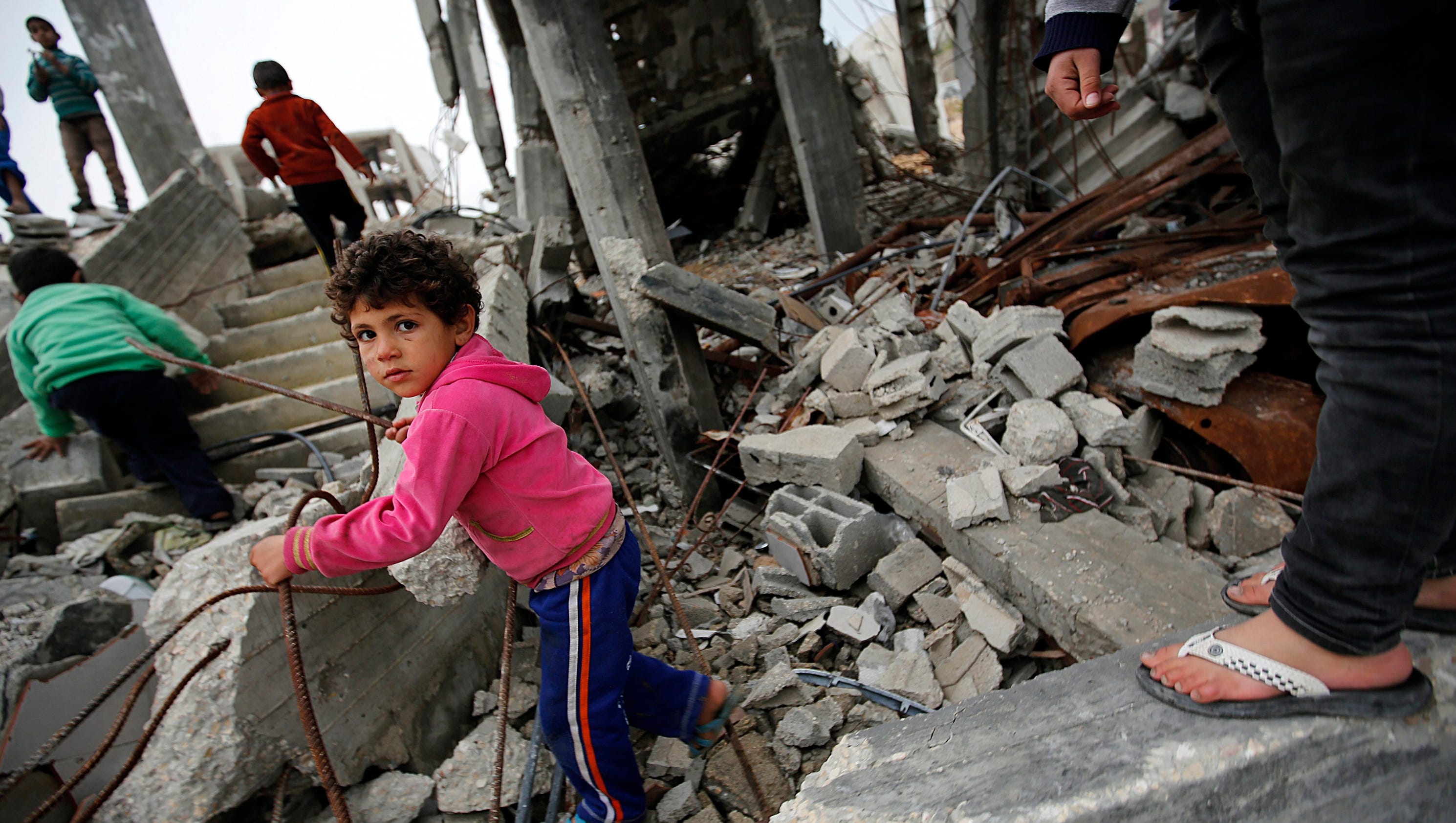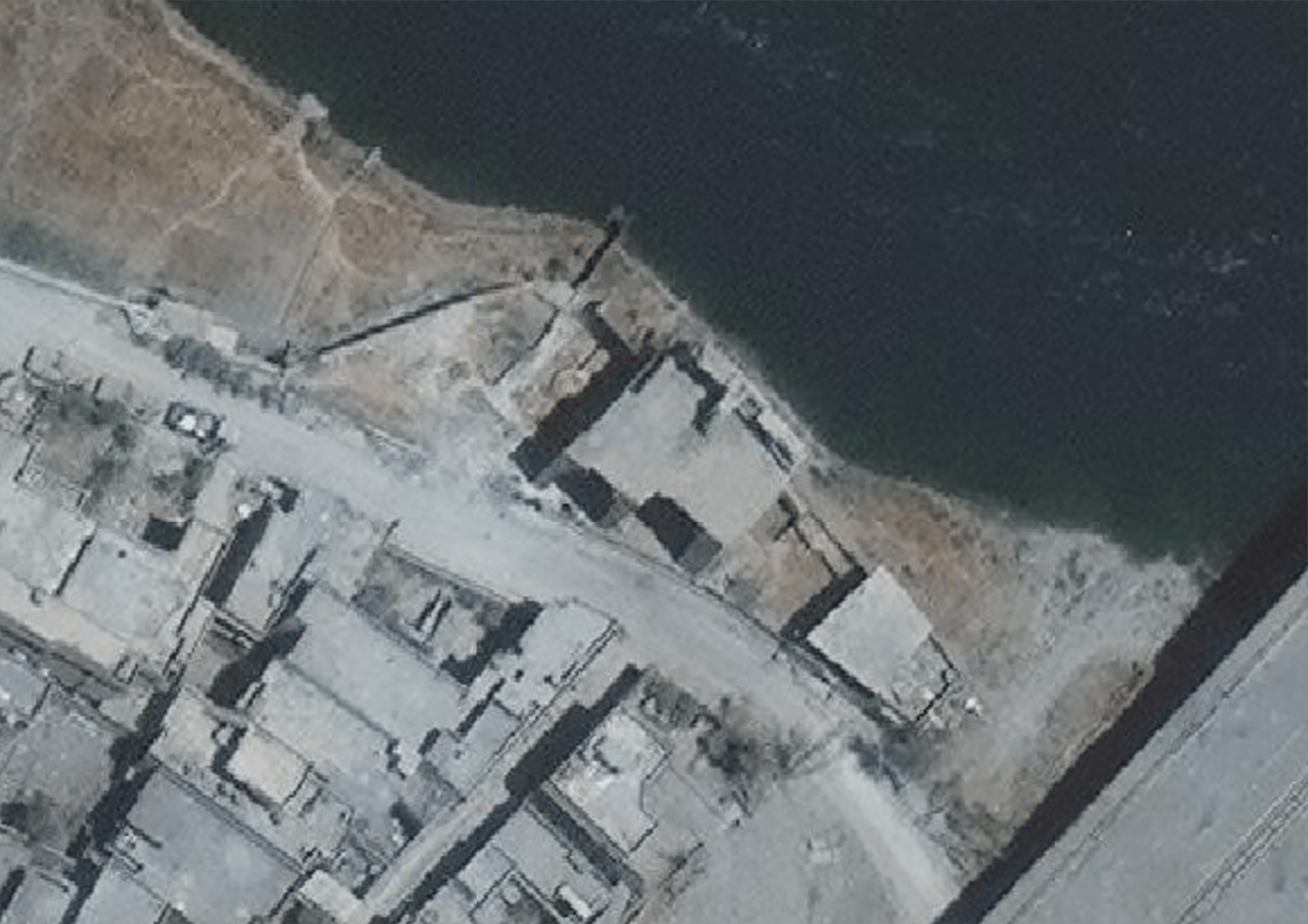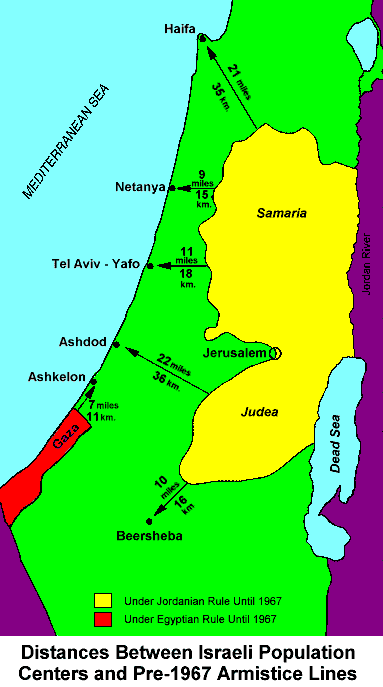President Trump’s son-in-law Jared Kushner meets with Israeli Prime Minister Netanyahu hoping for a breakthrough on peace talks between Israel and the Palestinians. After this session, Kushner goes to Ramallah to meet with Palestinian Mahmoud Abbas. This is the 50th anniversary of the 1967 Mideast war where Israel captured the West Bank, East Jerusalem and Gaza.
One of the big issues with the Palestinians is the construction of ‘settlements’ which this site takes extreme exception to that term. The other term used by the Palestinians which should never be accepted is ‘occupation’.
It refers to General Allen and 1967 lines, proposed during Obama’s term as president. Israel is always prepared for these types of meetings and had already formally rejected any re-proposal for The Allen Plan.
Does this look like Israel can defend itself reverting to 1967 lines? Further, that proposal demands Israel to relinquish the most sacred historical territory.
EXECUTIVE SUMMARY: The Trump White House is currently reexamining the Allen Plan, an Obama-era proposal that calls for a Palestinian state in the 1967 borders with no IDF presence whatsoever. This plan is dangerous. If it is implemented, Israel will have to rely on foreign forces for its security, a situation that has not worked in the past. More than that, it is antithetical to the Israeli ethos of self-defense and self-preservation in the Jewish homeland.
Col. Kris Bauman’s appointment as Israel adviser to the US National Security Council is a noteworthy event. He assisted Gen. John Allen in formulating recommendations for security arrangements for Israel in the context of a permanent settlement, to which then-Secretary of State John Kerry aspired. This set of recommendations came to be known as the Allen Plan.
Gen. Allen’s vision was detailed in a comprehensive document prepared at a US research institute by two Israelis and two Americans: Gen. (res.) Gadi Shamni and Nimrod Novik, along with Ilan Goldenberg and Col. Kris Bauman.
The plan envisages a Palestinian state with full sovereignty inside the 1967 borders, its capital in east Jerusalem, with minor modifications for settlement blocs. The plan is based on complete acceptance of the Palestinian demand for full sovereignty. This means no IDF soldiers anywhere in their state, which would extend from the Jordan River to the 1967 line.
In lieu of Israel’s demands regarding defensible borders, which include an Israeli military presence in the Jordan Valley to ensure the Palestinian state’s demilitarization, the plan proposes a varied and complex security solution. One element would be a US military force that would operate in the Jordan Valley. As the document’s Executive Summary states,
The purpose of this study is to demonstrate that well-thought-through security measures in the context of the two-state solution can provide Israelis and Palestinians with a degree of security equal or greater to that provided today by Israel’s deployment into the West Bank…
The basic problem is the notion that Israel will rely for its security on foreign forces. Not only is it difficult to ensure that such forces would fulfill their duty successfully, but it is uncertain whether or not they would stay in place – particularly after they have suffered casualties like those they have suffered in Afghanistan and Iraq over the past decade.
Recall that during the waiting period before the Six-Day War, the security guarantee given by President Eisenhower to Ben-Gurion after the 1956 Sinai Campaign evaporated. When he demanded that Israel withdraw unconditionally from the Sinai Peninsula, Eisenhower promised that if the Straits of Tiran were ever again closed to Israeli shipping, the US would intervene. Yet when Israeli foreign minister Abba Eban came to Washington in May 1967, President Johnson candidly explained to him that Eisenhower’s promise – however estimable – was no longer a practical proposition. With his army bogged down in Vietnam, Johnson apparently could not have gained the nation’s or Congress’s support for an intervention in the Straits of Tiran even if he had wanted to.
The main concern is that the existence of the Greater Tel Aviv area – indeed, the daily routine of the State of Israel – will come to be dependent on the goodwill of foreign forces. That is the heart of the matter. Do we want Israel to be no more than a haven for persecuted Jews where they can subsist under foreign protection? Or do we want Israel to be a place of freedom, a homeland, in which we alone are responsible for our own security and sovereignty?
The authors of the Allen document emphasize that Israel’s security would continue to be based on the IDF’s power. But it is hard to imagine under what circumstances Israel would attain the international legitimacy to pursue an offensive deep within the Palestinian state, should the need arise. Regarding the conditions that could justify an IDF operation in Palestinian territory, the document says:
The Palestinians will never agree to an Israeli right of re-entry, but there could be a side agreement between Israel and the United States on the conditions under which the United States would support unilateral Israeli action. Ultimately, Israel is a sovereign state that enjoys the right of self-defense. Thus, it can unilaterally violate the sovereignty of another state, but with the attendant risks that would have to be weighed by Israeli leadership.
Should the IDF evacuate the territories completely, as envisaged by this plan, the Palestinians would certainly employ their carefully honed tactical and strategic talent for nonaccountability and ambiguity. They would take care to ensure that the Palestinian state cannot be defined as a hostile entity against which a “just war” can be declared. Whether deliberately or not, they would be able to let “rogue,” non-state forces do their work for them, and avoid taking responsibility. What then?
There is also good reason to doubt whether conditions for demilitarization can be maintained. In an era of global arms proliferation, and of forms of smuggling that elude surveillance (as in the flow of weapons to Hamas in Gaza and to Hezbollah in Lebanon), along with increasingly sophisticated local arms manufacture, there is no way to guarantee real demilitarization without a constant effort to keep the territory fully isolated and to operate within it.
We must also take into account the possibility that war could erupt in more than one arena at at a time. If war were to break out with the state of Palestine in the West Bank, it could happen simultaneously in Lebanon, Gaza, and so on. The IDF would be unable to concentrate its efforts in the West Bank arena – which, because of its geographic proximity to Israel’s population centers, could inflict a heavy blow. Under the new conditions of war, which are fundamentally different from those that prevailed in June 1967, reconquering the territory would be incomparably more difficult.
And what of the document’s validity under changing conditions? The security solution the document proposes must be weighed in terms of the time dimension, and in circumstantial contexts that are subject to change. If a solution is responsible and workable, what time span is envisaged? Who knows under what evolving circumstances the solution will be required to provide protection to a state of Israel that has been trimmed down to the coastal plain? Is there not also a need for responsible risk management regarding contingencies that are still beyond the horizon?
We must ask to what extent we ourselves, with the excessive emphasis we have placed on security concerns in recent decades as a key criterion by which to assess any prospective solution, have laid the groundwork for Gen. Allen’s plan. His security document is, after all, intended expressly to offer a technical solution to all the familiar security issues. It would leave the Israeli leadership without the faintest possibility of invoking a security pretext to ward off the “peace solution.”
In describing Kerry’s efforts, Thomas Friedman asserted (The New York Times, February 17, 2013) that in light of Gen. Allen’s solution for Israel’s security concerns, the Israeli government had reached a juncture where it would have to choose between peace and ideology.
Perhaps we have forgotten that protecting the national existence, in terms of how the IDF defines national security, does not pertain solely to ensuring the physical existence of the citizens of the country but also to safeguarding national interests. A national interest – such as the sovereignty of the people of Israel in their capital, Jerusalem – can go far beyond the technical contents of a plan for security arrangements, however worthy. Security is only a means, not an end in itself.
From a practical, professional standpoint, Gen. Allen’s plan leaves much to be desired. But on a deeper level, it completely ignores the possibility that the people of Israel, in renewing their life in their homeland, are motivated by something much greater than the need for a technical solution to security concerns.
 USAToday
USAToday



 Tomb of Sarah, wife a Patriarch Abraham
Tomb of Sarah, wife a Patriarch Abraham

